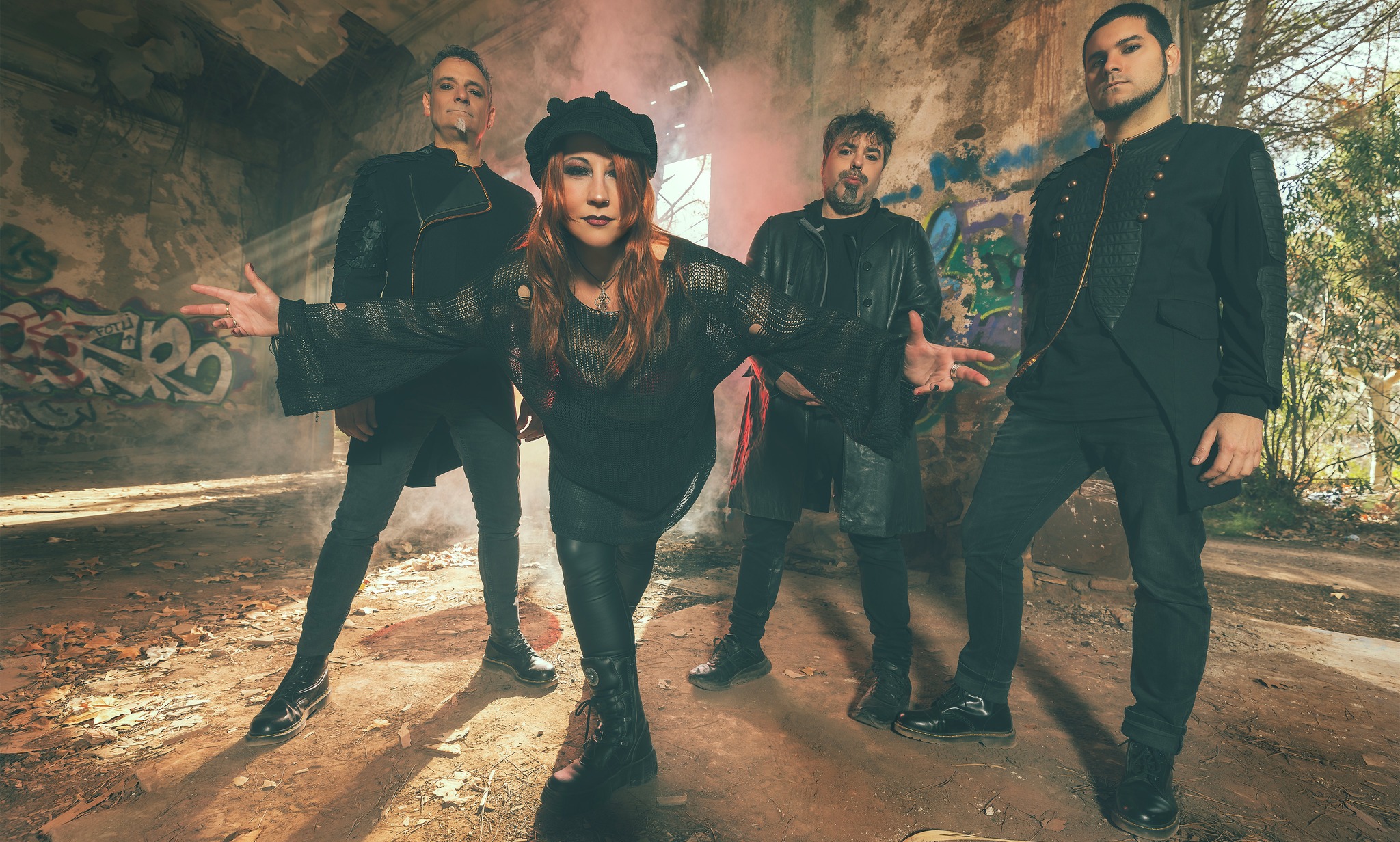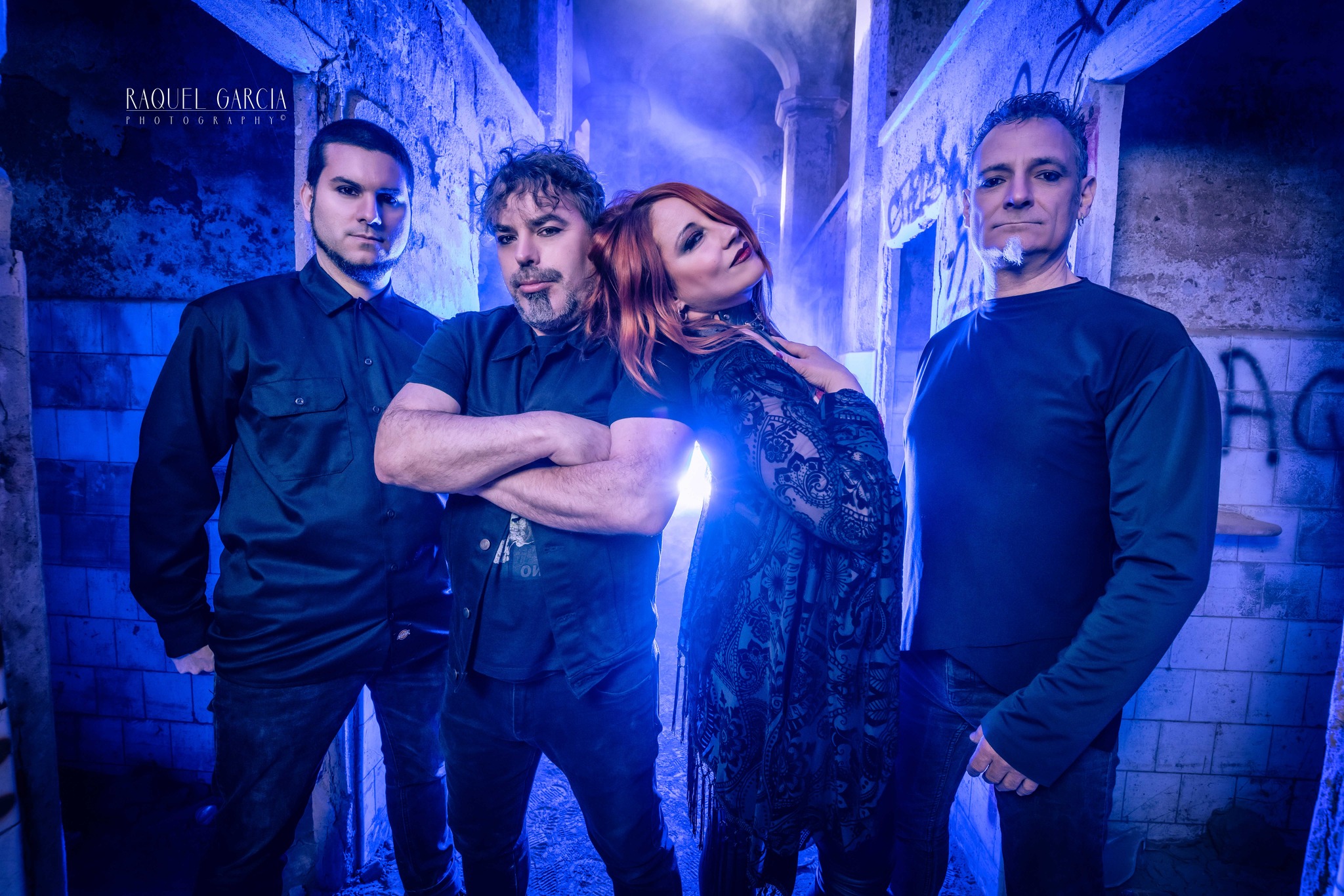Hailing from Barcelona-Spain, Braindrag simply amazed from the beginning with their mesmerizing album, Coure Roent. Amazing sound, amazing atmosphere, amazing music! You can read the interview I conducted with Braindrag’s members, Enric SG (guitar), and Mireia Perez (vocals). Moreover, please check and listen to Coure Roent, released by Wormholedeath Records.
I’m not sure what to begin with, but the first time I listened to Coure Roent, I was mind-blown from the beginning, I was mostly impressed by Mireia’s vocals! Congrats on such a great album! Coure Roent is a mix of rock, heavy, and even gothic metal. How did you approach the sound of Coure Roent?
Mireia: Enric will explain more about the technical part of achieving it, but in my opinion, the sound of Braindrag arises from the band’s own philosophy. Each song is a story interpreted differently by each of us. These stories merge to create a harmonious echo that reflects the band’s personality. That’s how the atmospheres are drawn, which must align with the content of the lyrics. “In Pro Human Race”, for example, it tells the story of the first person of someone who knows they will meet their end under a starry sky full of beauty but dies abandoned due to the horrors of wars and the selfishness of humans. The music is the soundtrack to that story.
Enric: Well, the sound of Coure Roent is the Braindrag sound, and it initially stems from the individual contributions of each member, followed by a collective synthesis. But generally, for the album, we aimed for a versatile but primarily hard and impactful rhythmic base. It was important for the guitars to be capable of expressing different and even distant personalities from classic metal, and that at times their effects and synthesized sounds would add color to each song, just as they could show their dirtier and more aggressive side. The electronic production of synthesizers and effects is needed to help us penetrate sonic landscapes more easily. The mixing and production of the sound had to be capable of showing charm, delicacy, and sensitivity as much as aggression, forcefulness, and modernity. This was our plan.
Moreover, the album reminds me, sound-wise, like Xandria’s 2005 India and 2007 Salome- The Seventh Veil. A lot I would say…
Enric: None of us knew Xandria. I’ve been listening a bit to the albums you mentioned, and I understand why we might remind you of them a bit. The way they worked with oriental sounds and rhythms in “Sisters of the Light,” for example, is similar to our tribal work in “Pro Human Race.” I also liked the sound of their guitars, they have a lot of grit.

To make a bond with the album title, which translated from Catalan would be ”Red Hot”, what is the concept behind Coure Roent?
Enric: First, I must correct you. The literal translation is “Red-hot copper.” Nevertheless, the translation of those words has a shared meaning since “Coure Roent” is the name of the butterfly “Lycaena virgaureae,” which appears on the album cover. All of this has a story and a process that I’ll explain now. When Mireia joined the band, she brought us light, liveliness, and color. At that moment, by chance, I discovered a photo of an oxidized copper sheet with all its colorful hues, and I immediately associated it with the moment the band was experiencing. I started using it for our corporate image, as it was a colored metal, just like Braindrag with Mireia. Later, I discovered the butterfly and its spectacular name “Red-hot copper” and also identified it with the change of singer and new stage of the group, as the butterfly represents transformation, hope, and positivity. This idea begins with our previous EP cover Atreverme. There you can see the larva of the “Lycaena virgaureae” walking on the oxidized copper sheet, and in the CD artwork, you can see the chrysalis hidden, awaiting transformation. Braindrag’s transformation happens in Coure Roent, and that’s why you can already see the butterfly.
You have signed a record deal with Wormholedeath Records as well in order to release this amazing album. So far, what feedback did the album receive from the media, fans, and the new listeners who just discovered your band?
Mireia: Personally, I am still thrilled by the impact and the impressive reception that Coure Roent is having. Since we released the album in early March, things have been happening quickly, with exponential and positive growth. The truth is that the album’s reviews from the media and industry professionals have been very good worldwide, on both sides of the Atlantic. At this point, I have to applaud the work of the Wormholedeath Records team because they are really supporting us a lot, showing that they believe in us, even though our relationship with them has just started! We know we have a very special project in our hands, we have strongly bet on authenticity, and the risk has been worth it. It’s an album that is attracting fans from different styles, even fans who don’t usually listen to metal, suggesting that we are gradually reaching a wide audience.
Enric: What has been most commented on and valued is our originality. Both in Spain and abroad, we are told how difficult it is to find a similarity to Braindrag, the ability to give personality to each song, to be varied in rhythms and approaches… And for that reason, it invites being listened to more than once. We are told that it is a journey through different landscapes, even a hypnotic journey. The sound production is also well-received, and recognized as meticulous and well-crafted work. The reviews are really very good, no matter where they come from.
You had several shows in Spain lately. Are you planning more shows in the future, both in Spain or even a tour in Europe?
Mireia: We have shows scheduled until the end of the year, several festivals, and some club dates, and we are already starting to plan shows for 2025. A tour of Europe would be a dream; we don’t rule it out!
Enric: I suppose that depending on the reception the band might have in different areas or markets in the future, the horizons could change. For now, we want to combine concerts with composing new material.
I would love to see you on stage someday! I hope I will soon!
Enric: Thank you very much! We hope so too!
Initially, Braindrag was formed with a male vocalist (former Luis Moss), later, Mireia P. replaced Luis. How was the transition from a male to a female vocalist, was it a challenge for you?
Mireia: It was an absolute challenge for me! Moreover, Luis Moss has a very deep range, and I had to adapt the melodies to a female register. It took me a while to be able to have an interpretation of his songs that I could defend, hehe. Luis Moss has collaborated with us on several shows, and you should see how powerful the songs are when we sing together.
Enric: For me, it wasn’t just the male-to-female gender change, it was the big stylistic difference between them. Naturally, when composing, it was something very important to consider.
You’re from Barcelona-ES, and I would like you to tell me a few words about the metal scene in your city, how is it, and can you recommend other bands from your area that people should know about and listen to?
Mireia: I would love to be able to tell you that there is a wide and rich rock and metal scene in Barcelona and Spain, but unfortunately, I can’t. The scene has been in crisis for some time and is sustained by the great effort, I would dare say, personal effort of associations, some media, and venues, and a public that supports it but is increasingly scarce. Maintaining an original music project is very difficult. Public administrations hardly provide any aid, and bands end up suffocating. Mainstream media focus on promoting other styles, ignoring rock music, and it’s truly a titanic effort to make a name for oneself. Major festivals promote emerging bands very little, and if they do by giving them a show, sometimes they don’t even pay them. That’s why bands like Serapis Project, Worth, Haunted Gods, Forja, Th3 Climb, Embellish, La Senda de Carol, and many more have all my admiration and respect. Hopefully, this can change in the future!
Enric: I would like to add that the phenomenon of tribute bands has made things even more difficult for emerging groups. I’ll give you just one specific example. We wanted to organize an event at a well-known mid-sized venue in Tarragona (an important city in southern Catalonia), where we wanted to play Braindrag, Elisa C. Martin (ex-Dark Moor), and a local band from the area. Well, the promoters of that venue did their calculations and believed that about 100 people would come to see us. They said that wasn’t a good business for them. That venue usually schedules tribute bands, which bring in a lot more people, and they didn’t give us the opportunity to play in that city. That’s where we stand.
To end this interview, is there anything else you would like to add?
Mireia: Thank you for the time we’ve spent together and the support you give us. Thanks to the public and everyone who makes it possible for Braindrag to continue. Braindrag on fire!

https://www.facebook.com/braindrag
(Photos by Raquel Garcia)
If you really would like to support Antichrist, you can just Share our article.
You can also support Antichrist by sending a couple bucks to cover some webhosting expenses. =>> PayPal



